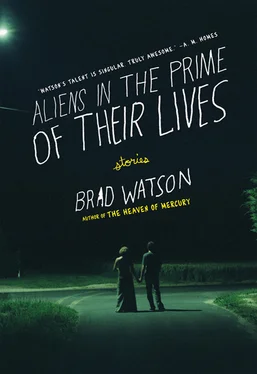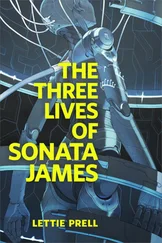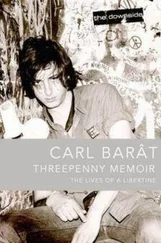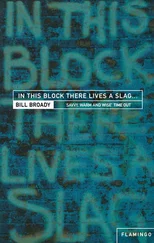“Was the phone for me?” he said, looking up.
“No. You ready?” He nodded. I pushed and got him going a little ways and said, “Okay, go.” He tried to, but his feet slipped off the pedals and the bike fell over with a crash. The alleyway road’s a dirt one, hard-packed sand with a little gravel ridge in the middle and scattered gravel on the edges. Carl got up breathing through his nose and scowling and blinking his eyes. I felt my skin prickle with shame and I ran over to help him pick up the bike.
“Jesus, Carl, I’m sorry,” I said, almost to myself. “My fault. My bad.” I pushed the hair from his forehead and looked at him. He frowned and pulled his head away. “I’ll do it right this time,” I said. I looked back at the house. Lanny’s head still at the window.
Carl wouldn’t look at me. He got on the bike again. I grabbed the back of the seat.
“Ready?” I said.
He gave a serious nod.
“Is Mama watching?” he said.
“Yeah.”
We took off. I ran beside him, holding on with one hand. He didn’t pedal, but kept his feet ready and his eyes straight ahead. He was on the right-wheel path. I ran on the gravel ridge, having a tough time of it. Then I let go and ran beside him and yelled, “Pedal!” and in a second he did and took off down the alleyway. He was going pretty good. Down where the alleyway ran into the street, he slowed and fell over. He jumped up and hopped around, holding his elbow.
I called out, “You all right?”
He stopped hopping and examined his elbow. Then he picked up the bike and walked it back to me.
“Did Mama see that?”
“I don’t think so.” I didn’t turn to the window. Carl stared at the house for a minute. A group of kids rode by in the street down where Carl had fallen over. They were younger than the Road Hogs, ringing chrome bells clamped onto their handlebars. The ringing faded, shring-ring, fainter than their shouting voices, then was sound lost in rustling leaves and air.
Carl climbed back onto the bike, and I grabbed hold and pushed him going again. He wobbled a little when I let go but didn’t fall down when he turned, and got started back to me by himself. He got the hang of it and rode back and forth for a while, up and down the alleyway. I smoked a couple of cigarettes and watched. Carl whizzed past on the bike, kicking up dust.
He was having a time. He started trying to do wheelies, catching on so fast because he’d waited so long, hanging around such good riders. He was being cool, paying me no mind. And he was beautiful, with his hair blowing back away from his forehead. The breeze had died and the air was quiet. The phone lines and power lines dipped and rose from pole to pole along their graceful paths through the trees, and in the quiet warmth of the evening I could almost hear them humming. I sensed a vague feeling of dread creeping in, but then Carl zipped up and skidded to a stop, breathing hard and sweating, his eyes wide open.
“It’s almost suppertime,” I said.
“Can I stay out just a little bit longer?” He leaned forward over the handlebars, pleading.
I remember this moment sometimes, by itself. It stands apart, in balance, like Carl balanced over the handlebars of his bike, wanting another few minutes outside. There are moments like that, and when you remember them they grip you inside. But at the time I only hesitated for a second.
“Go ahead,” I said.
It was twilight. Lamps snicked silently on in houses. I walked down the alleyway toward the street, where light bloomed pinkish in streetlamps curved from poles like thin-chromed gargoyles brooding over what traffic might wander their way.
I crossed the street and walked on in the relative dark of the alleyways, into a part of the neighborhood whose houses from the back looked unfamiliar. The shadows had deepened. The trees were towering dark shapes. A bit of breeze ran through them like a shiver.
I turned and started back, taking my time. Sounds changed subtly with the light. And in the cooling calm of the settling dusk I became aware, like someone waking up from a dream, of a steady ringing.
Behind one house I stopped in a mimosa’s shadow to watch. Under a single lamp, sliding-glass door open for a breeze, a fat scarlet man and woman in T-shirts and three near-naked pudgy children sat eating supper. Their faces glistened with sweat. Steam rose from their meal. Their phone was ringing. It stopped for a moment, then began again. None of them said anything, glowering, forking food into their mouths with an angry urgency.
I walked on toward my house through the darkening backyards. In every house the phone was ringing. Toot Nelson stood beside his, yelling at his oldest son and pointing outside. The boy ducked his head and came out the back door, his startled angry face looming suddenly into mine.
“ Yah! ” He jumped back. We stared. He turned wide-eyed and hurried on.
I crossed through a yard and out into the street. Through the screen doors and windows open for fall breezes I could hear the phones ringing as I walked. A television blared in the Hirlihues’ house, blue light filled their empty den. Before I stepped onto our porch I saw the dim figure of a phone-company truck parked way down the street.
I cupped my hands and hollered, “ Carl! ” No answer.
Except for the kitchen, the house was dark, and I stood there for a minute in the den, the phone in the hallway jangling dully on, off, on, like a senseless alarm. In the dark the rooms felt vast, everything in the air tingling and electric, jumping needles. I felt I couldn’t breathe in enough air. I inhaled until I could feel a small tight spot deep in my chest expand like sore muscle. The dread welled up and spread through me. In the kitchen the phone rang, stopped, and began ringing again. Lanny stood at the sink washing tomatoes and ignored it.
“There’s a phone truck parked down the street,” I said.
“A man came by and said to let it ring while they fixed it.” She looked up, her face blank.
“I taught Carl to ride,” I said.
She stood at the sink with her hair pulled back tight in a ponytail, wearing an old loose sundress and sandals. She dried a tomato and set it beside two others on the porcelain drainboard beside the sink. Behind her on the stove the potato halves rose and tumbled like the blunt noses of tiny white whales.
“Supper’s almost done,” she said.
It was dusk outside, the sky a deep dark blue, a thin line of pale pink above the tree line high in the darkening window. The glaring overhead light in the kitchen cast an odd glow on things. It made her skin look weirdly smooth, like a doll’s. I looked at my hands. Skin and veins stretched taut over bone and muscle. The phone rang. It rang again. And then it stopped. We stood waiting for it to start again. She stood at the sink looking down. I went over to her and touched her arm. I felt her stiffen. I put my arm across her shoulders and tried to hug her to me.
“Don’t,” she said.
I pulled her closer, but she stiffened.
“Don’t make a scene,” she said. “Carl’s outside.” I looked but didn’t see anyone outside the window. Then I saw someone sitting in the fork of the cherry tree, just a silhouette in the failing light. A bike lay on its side in the grass. I looked back at Lanny, let her go. She stared at the tomatoes on the drainboard. I looked again at the figure in the tree. It was hunkered down on a branch. A shape not sharp but vague in the faint light, shading darker in almost clocklike moments. With the kitchen light on, through the screen, you couldn’t tell who it was.
“That’s not Carl,” I said.
“What?”
“Carl’s riding,” I said. “Must be some other boy, spying. Maybe it’s Toot’s boy.” I leaned toward the window. “Go on, now,” I called. It sat still. Too small for Toot’s boy.
Читать дальше












